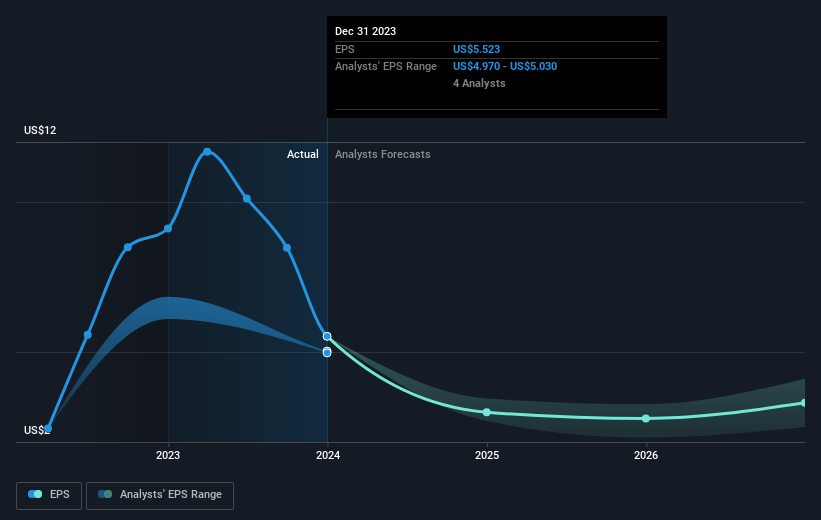Stock Analysis
- United States
- /
- Oil and Gas
- /
- NYSE:BTU
Peabody Energy's (NYSE:BTU) investors will be pleased with their fantastic 569% return over the last three years

Investing can be hard but the potential fo an individual stock to pay off big time inspires us. Mistakes are inevitable, but a single top stock pick can cover any losses, and so much more. One such superstar is Peabody Energy Corporation (NYSE:BTU), which saw its share price soar 560% in three years. In the last week the share price is up 2.6%. It really delights us to see such great share price performance for investors.
Let's take a look at the underlying fundamentals over the longer term, and see if they've been consistent with shareholders returns.
View our latest analysis for Peabody Energy
There is no denying that markets are sometimes efficient, but prices do not always reflect underlying business performance. One way to examine how market sentiment has changed over time is to look at the interaction between a company's share price and its earnings per share (EPS).
During three years of share price growth, Peabody Energy moved from a loss to profitability. Given the importance of this milestone, it's not overly surprising that the share price has increased strongly.
The company's earnings per share (over time) is depicted in the image below (click to see the exact numbers).

We know that Peabody Energy has improved its bottom line over the last three years, but what does the future have in store? Take a more thorough look at Peabody Energy's financial health with this free report on its balance sheet.
What About Dividends?
As well as measuring the share price return, investors should also consider the total shareholder return (TSR). The TSR is a return calculation that accounts for the value of cash dividends (assuming that any dividend received was reinvested) and the calculated value of any discounted capital raisings and spin-offs. It's fair to say that the TSR gives a more complete picture for stocks that pay a dividend. We note that for Peabody Energy the TSR over the last 3 years was 569%, which is better than the share price return mentioned above. The dividends paid by the company have thusly boosted the total shareholder return.
A Different Perspective
While the broader market gained around 22% in the last year, Peabody Energy shareholders lost 6.7% (even including dividends). Even the share prices of good stocks drop sometimes, but we want to see improvements in the fundamental metrics of a business, before getting too interested. Unfortunately, last year's performance may indicate unresolved challenges, given that it was worse than the annualised loss of 3% over the last half decade. We realise that Baron Rothschild has said investors should "buy when there is blood on the streets", but we caution that investors should first be sure they are buying a high quality business. While it is well worth considering the different impacts that market conditions can have on the share price, there are other factors that are even more important. For instance, we've identified 3 warning signs for Peabody Energy (1 is concerning) that you should be aware of.
If you are like me, then you will not want to miss this free list of growing companies that insiders are buying.
Please note, the market returns quoted in this article reflect the market weighted average returns of stocks that currently trade on American exchanges.
Valuation is complex, but we're helping make it simple.
Find out whether Peabody Energy is potentially over or undervalued by checking out our comprehensive analysis, which includes fair value estimates, risks and warnings, dividends, insider transactions and financial health.
View the Free AnalysisHave feedback on this article? Concerned about the content? Get in touch with us directly. Alternatively, email editorial-team (at) simplywallst.com.
This article by Simply Wall St is general in nature. We provide commentary based on historical data and analyst forecasts only using an unbiased methodology and our articles are not intended to be financial advice. It does not constitute a recommendation to buy or sell any stock, and does not take account of your objectives, or your financial situation. We aim to bring you long-term focused analysis driven by fundamental data. Note that our analysis may not factor in the latest price-sensitive company announcements or qualitative material. Simply Wall St has no position in any stocks mentioned.

Simply Wall St
About NYSE:BTU
Peabody Energy
Peabody Energy Corporation engages in coal mining business in the United States, Japan, Taiwan, Australia, India, Brazil, Belgium, Chile, France, Indonesia, China, Vietnam, South Korea, Germany, and internationally.
Flawless balance sheet and undervalued.
